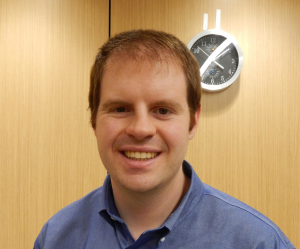Alumni Q&A: Forrest Glines on Pursuing a Science PhD post-ACME

Forrest Glines entered ACME with a plan quite different from most ACME students: a Physics PhD. While many ACME students have continued to work towards a PhD in math or computer science, only a handful have chosen a science field. Forrest is now a PhD student at Michigan State University in their Astrophysics program with a dual-major in Computational Science, Mathematics, and Engineering. Speaking from experience, he shared with me what ACME students hoping to end up in a science field need to remember–both while an undergraduate, when applying for graduate schools, and after beginning a PhD. He also shared about his research, his path to graduate school, and his philosophy on choosing the right graduate program.
CH: Hi Forrest! Can you share what you’ve been doing the past few years and where you are now?
FG: Yes, I’m a PhD student at Michigan State University. I started at BYU doing physics, specifically numerical modeling of astrophysics-type objects. A broad umbrella name for this field would be plasma physics. This interest led me to need to improve my applied math and modeling skills, which is why I joined the ACME program. In addition to ACME, I minored in Computer Science since relies on efficiently using computing resources, and I also did an internship at Los Alamos National Laboratory in the same field of modeling astrophysical plasmas.
After my undergraduate at BYU, I got accepted at Michigan State University in their Astrophysics PhD program, which was a transfer from traditional physics to more of an astronomy focus. It was still a continuation of plasma physics and physical modeling, but now with a specific astronomy science goal in mind. I actually am working on a dual-major now since my advisor is in the Department of Computational Mathematics, Science, and Engineering (CMSE). This complements the numerical modeling work I was already doing in astrophysics. I also started working part-time with Sandia National Laboratory on some of their projects to continue my connection with the National Lab program.
CH: How does it work to have dual-majors in a PhD?
FG: The degree is technically an astrophysics degree with a focus on computational modeling with CMSE. The CSME is more of an emphasis. The vast bulk of my research and my graduate experience is astrophysics. It was definitely a transition to go from physics to astrophysics. I don’t think this is applicable to everyone who is going into the sciences after ACME, but it was doable for me.
CH: Can you share about your research?
FG: I work on a number of projects that all fit under plasma physics and astrophysics. Particularly, I have one project looking at how supermassive black holes in the center of galaxy clusters–which are the largest gravitationally bound objects in the universe–regulate the temperature and structure of the resident galaxy clusters. I also do research on idealized models of turbulence in magnetized plasmas. Magnetized turbulence has always been an enigmatic problem that people have struggled with for a very long time, and we are going to continue struggling to understand for some time. A large part of turbulence research involves huge numerical models.
CH: When did you decide you wanted a PhD and why did you decide to go this route?
FG: I had a PhD decided from the onset since in the field of physics, if you want to do research, you need a PhD. A lot of science fields are like this: if you want to do research you need a PhD. However, there are opportunities as a lab support or lab technician without a PhD.
CH: Can you talk about what kind of preparations outside of ACME were needed to prepare for grad school?
FG: I have a lot of opinions on how to prepare for grad school. The broader picture is that if you go the route of doing a science degree with math, you need to focus on the domain science to get a position at a good graduate school. Your primary science should be your focus even above ACME. Although ACME does help you doing the science, your domain science should be the focus.
As far as preparing for grad school, the big indicators are a mix of good grades, good test scores, and somewhat public outreach and involvement with the broader science community. But the biggest one is real research experience. BYU is actually a pretty special school in that a lot of the research at BYU is done by undergraduates. A lot of the students coming out of BYU have a unique research experience as undergraduates. The best way to capitalize on this advantage is to do your best to get a publication in a journal in the field of science you plan on working on. That means finding an advisor outside of ACME in the field of your choice that does numerical modeling. That would be my biggest suggestion for people to prepare for graduate school. Do a research topic in science using numerical modeling and get it published.
CH: Is this what you were able to do in undergrad?
FG: Yes, with the caveat that my paper turned out to be published in a computer science journal, which is less impactful when applying as an astronomy graduate student. If I could have changed one thing, it would have been to publish in an astrophysical journal.
So that’s my opinion on preparing for graduate school. Applying is another topic. My opinion on that is your primary focus should be on finding a good professor and good people to work with unless you are just going for a prestigious school. In almost all the fields of science, a prestigious school only matters if you plan on leaving the field for an unrelated industry job. Instead of prestige, you should focus on finding a professor who is well connected, does high impact work, is someone you can get along with and work with for 6 years, and who has enough time to actually mentor you throughout your time in graduate school. The main point of graduate school is doing research, and your experience with your advisor is probably one of your biggest factors in how well you can get that research done.
My opinion would be to apply to many different places, specifically looking for a professor you want to work with. Maybe apply to ten schools or more and keep in mind that it’s very much a lottery. Even if there is a professor at the school who would like to hire you and you could work well with, they don’t accept students every year. Maybe one out of three years they are actually looking for a graduate student. Especially in the next few years when undergraduate attendance is down, there will probably be fewer spots open for graduate students.
If you don’t get into a school with a professor you think you can work well with, it’s a good idea to take an extra year to do research or get a masters degree at BYU and then reapply to graduate schools. You should also consider doing research at the national labs or universities. Sometimes these positions are called “post-bachelors” which BYU might not do as often, but at other schools it is more common. The National Labs usually have positions available. As you prepare for graduate school, it can be a good idea to forge a relationship with scientists at one of the national labs so that if your graduate school applications fall through, you could probably take a year with an advisor at a national lab.
CH: How did ACME help prepare you for graduate school?
FG: My general opinion is that ACME probably does not strengthen your application to a science PhD, but it does make you a much better scientist. In many ways it can set you apart from other people in the field. It is highly valued by professors who do numerical research in their scientific field even if it’s not something they are specifically looking for on applications.
As a broad overview, ACME taught me the mathematical theory background on numerical modeling, PDEs, and optimization–all of which are clearly, directly related to my field. It was obvious these topics would help me in my modeling. For topics like statistics–I didn’t actually pay as much attention to it as I should have when I was in ACME as it’s ubiquitous in all fields of science. The theoretical background in machine learning, as an emerging technology, is also helpful. Many scientists are interested in leveraging concepts from machine learning in their science research and it can definitely help you later down the road in scientific computing.
ACME also taught me to do scripting efficiently and take a mathematical model and put it into code. This is an extremely valuable skill in science. It’s essentially what I do time anytime that I do some analysis or modeling. Many of the tasks I do daily boil down to implementing an algorithm, and because of all the practice I got from ACME, I can do it in an hour and it’s really quick. It definitely gives me a leg up over other students who might just be getting into analysis scripting when they start their graduate career.
In general, I haven’t met too many people in astrophysics who have same science, applied math, and computer science background that one gets from ACME. There are many other people in the sciences who have a strong background in math. There are also many with a strong background in computer science. But very few have both, like you get from ACME.
CH: Do you have anything else you want to share with ACME students?
FG: Yes– Everything I’ve said so far has been from the perspective of going into a science degree using math. But it’s also a very good option for ACME students to go into a mathematics graduate degree that does science. There are plenty of people in the field of applied math who focus on the same numerical modeling you learn from ACME but are contributing directly to scientific fields, it’s just not the primary focus of their degree. That route is probably a very good option for ACME students. One example of such a department would be the Michigan State CMSE Department. At least take a look at it when you’re applying. These are mathematicians who have a secondary background in science.
If you wanted to go the route of a Math PhD with a focus in a field of science, you wouldn’t need to double major in undergraduate, you could probably just minor in the science. Or it would probably even be enough to learn the science skills in graduate school. Applied Math departments will be looking for applied math experience first. My previous advice about looking for research opportunities in undergrad still applies.
CH: I’m sure there will be some ACME students excited to know about this program as an option for them after ACME. Thanks so much for your time, Forrest! Good luck with your research!

